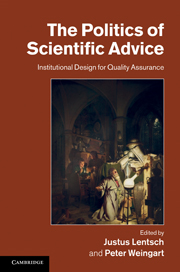Book contents
- Frontmatter
- Contents
- List of figures
- List of tables
- Acknowledgements
- Biographical notes
- Part I Methodological issues: quality control and assurance in scientific policy advice
- 1 Introduction: the quest for quality as a challenge to scientific policy advice: an overdue debate?
- 2 Quality control and peer review in advisory science
- 3 Reconciling representation with reality: unitisation as an example for science and public policy
- 4 Looking for quality in all the wrong places, or: the technological origins of quality in scientific policy advice
- Part II Collegial science advisory bodies
- Part III Collegial science policy advisory bodies
- Part IV Research-based advisory organisations
- Part V Academies of science
- Index
- References
4 - Looking for quality in all the wrong places, or: the technological origins of quality in scientific policy advice
Published online by Cambridge University Press: 25 October 2011
- Frontmatter
- Contents
- List of figures
- List of tables
- Acknowledgements
- Biographical notes
- Part I Methodological issues: quality control and assurance in scientific policy advice
- 1 Introduction: the quest for quality as a challenge to scientific policy advice: an overdue debate?
- 2 Quality control and peer review in advisory science
- 3 Reconciling representation with reality: unitisation as an example for science and public policy
- 4 Looking for quality in all the wrong places, or: the technological origins of quality in scientific policy advice
- Part II Collegial science advisory bodies
- Part III Collegial science policy advisory bodies
- Part IV Research-based advisory organisations
- Part V Academies of science
- Index
- References
Summary
Quality control in scientific policy advice is a vexing problem because it seems to encompass two conflicting conditions. First, people believe that improved knowledge about the world, communicated by experts to politicians and policymakers, can improve our capacity to deal with many challenges to our well-being, from terrorism to climate change to pandemic influenza. Science advice must aim at providing the best picture of what we know, as a basis for making better decisions than those based on a less-good picture. Second, because the world is complex, complete scientific understanding of the problems that decision-makers seek to address can never be attained. Choices must always be made about how to frame a problem, what type of research should be pursued to characterise the problem, whose research results are reliable and relevant and whose are not, and so on. Science, that is, has an inherently social and political element, all the more when it is carried out and applied in contested political settings (see Jasanoff, Chapter 2, and Oreskes, Chapter 3).
Almost three centuries into the Enlightenment – in this case, meaning the broad social consensus to use reason, and especially scientific reason, as a guide to human understanding and action – and sixty years into an era of modernity where scientists are recognised as crucial contributors to policy processes at national and international levels, it is perhaps an embarrassment, yet nonetheless no surprise, that we are still trying to figure out how to ensure quality, and even what quality actually means, at the intersection of science and policy advice.
- Type
- Chapter
- Information
- The Politics of Scientific AdviceInstitutional Design for Quality Assurance, pp. 54 - 70Publisher: Cambridge University PressPrint publication year: 2011
References
- 6
- Cited by



